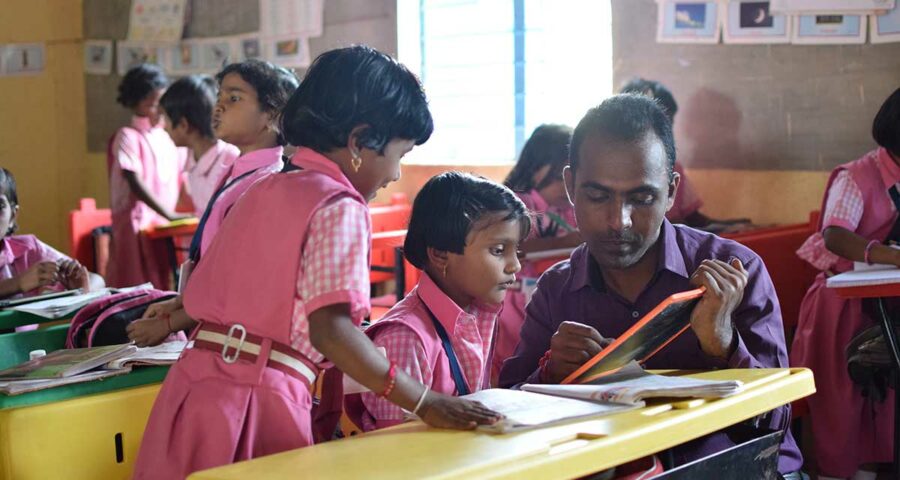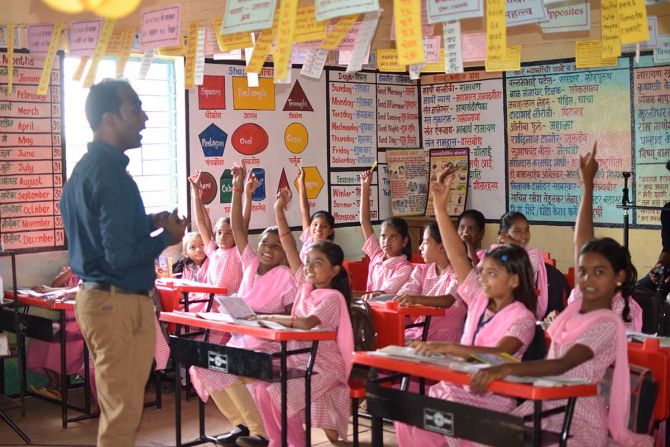‘We need a world tomorrow where there are no boundaries when it comes to education.’
“This century needs people who are not just educated, but also wise,” says Ranjitsinh Disale, a teacher from a state government-run district primary school in Paritewadi, a remote village in Maharashtra’s south-western district of Solapur.
Disale made global news earlier this year when he won the Global Teacher Prize worth $1 million for his exemplary work among girl students belonging to underprivileged sections of society at the Zilla Parishad Primary School, “which was actually a cattle shed” when he joined it in 2009.
And he shared half that prize money — Rs 3.5 crores (Rs 35 million) — with the other nine finalists for the coveted prize.
In the concluding part of his interview with Prasanna D Zore/Rediff.com, Disale says, “I don’t feel like I’m the best. I feel I’m first among equals. I thought I could support their excellent work by sharing the prize money. I don’t think I did anything extraordinary by doing so.”
- Part 1: The Indian Who Won the Global Teacher Award
What inspired you to get into teaching?
Actually, I was not supposed to be a teacher. My dream was to become an IT engineer.
I’m a big fan of technology. I studied engineering for six months but left the course as I could not cope with the bullying.
I was thinking of trying for admission in a new engineering college the following year. That’s when my father, who was a teacher, said, ‘Ranjit, why don’t you join a teachers’s training college for six months?’
He did not want me to stay at home without doing anything until the next academic year began. He suggested that I could become a teacher if I liked it or join an engineering college the following year.
I joined the teachers’s training college very reluctantly, but once I was there, I realised what teachers can do; experienced teachers can be real changemakers.
The credit for the way I’m able to talk now and my confidence and positivity goes to my teachers at the teachers’s training college.
Looking at how teachers can change the lives of their students, I asked myself: ‘Why don’t I become a changemaker and change the lives of underprivileged students? India needs teachers like the teachers at my college.’ They made me want to become a teacher.
What values did your parents inculcate in you as a child?
My father would always ask me to stay true to my nature. ‘Don’t pretend to be what you’re not and your life will go well,’ he would always tell me.
I follow his advice. Whatever the challenges, whatever the failures I face, I accept them positively.
Mothers are always warm and take care of their children. My mother taught me to be a kind person and a good human being. She encouraged me to support those who are less privileged than I am.
What role have they played in your life to help you reach where you are today?
Parents, obviously, play a crucial role in nurturing their kids.
The credit goes to my mom and dad and how they have raised me.
I am just a symbol of the life lessons they have taught me.
How do you go about teaching your students?
At the moment, due to the pandemic, schools are online. I teach my students for one hour every day from 8 am to 9 am.
At night, I teach science to students from other countries. Teachers from other countries request me to teach their students, so I do it.
I have got requests from more than 70 countries in the last three years and more than 80,000 students have benefited from my online classes.
You shared half your Global Teacher Prize award of $1 million with the other nine teachers who were part of final top 10. How did you arrive at this decision?
This was not a spontaneous decision; it was predetermined.
In my opinion, teachers work for outcomes, not income.
Sharing that prize money will actually help it grow.
We usually share our happy moments, information, mindsets, but sharing the prize money will help these nine teachers, from nine different countries, to continue their work. It will help their students embark on a journey of knowledge and education.
I feel the world is my classroom and I should work for students who need excellent teachers. These nine teachers will help me complete my mission.
Sharing the prize money was also a way recognise these teachers for the work they are doing in their respective countries.
I don’t feel like I’m the best. I feel I’m first among equals. I thought I could support their excellent work by sharing the prize money.
I don’t think I did anything extraordinary by doing so.
You gave away Rs 3.5 crores and you don’t feel that is extraordinary! What makes you so humble?
I already told you — teachers work for outcomes, not income. Teachers are not greedy. Teachers ultimately believe in the power of sharing.
I wouldn’t agree that I ‘gave away’ the money; I like to use the word sharing. It is my investment in these nine countries.
Through these nine teachers, their students will benefit and I get to do my share in fulfilling my mission of imparting education to underprivileged students across the world as well.
We need a world tomorrow where there are no boundaries when it comes to education.
This prize money will help all of us achieve our mission (in our respective countries).
What was the reaction of the nine teachers when you revealed that you’re sharing the prize money with them?
(Smiles) They were very shocked. One of the finalists from Africa actually cried. She said, “Ranjit, I never thought of it… If I were the winner, I would have never thought of sharing it.”
All of them were very happy and I was happy to see their happy faces when they heard that the winner was from India. One of them remarked, “(Though) Ranjit is the winner, all 10 finalists are happy.”
As you are conducting online classes, do all your students have access to the Internet and laptops?
They don’t have laptops, but they do have mobile devices.
After the pandemic began, I put out an appeal on social media requesting people to donate their used, old mobile devices to my students. This is how I ensured that each student has access to a mobile device.
As for Internet access, parents share their data with their children as well as with other students whose parents don’t have access to mobile internet.
I make sure every student attends the online classes, learning the way they love to learn when they are physically in school.
If you had to give a message to the youth across the globe, what would you say?
Follow your passion and try to be good citizens of the 21st century.
This century needs people who are not just educated, but also wise. We all are educated, but the way we are behaving during the pandemic is shocking.
To be wise, the youth across the world should follow their passion, understand their interest areas and continue working in those areas.
Source: Read Full Article


